Book contents
- Frontmatter
- Contents
- About the Contributors
- 1 Introduction
- 2 Untangling a Complex Web: Understanding Competing Maritime Claims in the South China Sea
- 3 China Debates the South China Sea Dispute
- 4 Taiwan's Evolving Policy towards the South China Sea Dispute, 1992–2016
- 5 The South China Sea: Primary Contradictions in China–Southeast Asia Relations
- 6 Rising Tensions in the South China Sea: Southeast Asian Responses
- 7 The Philippines and the South China Sea Dispute: Security Interests and Perspectives
- 8 A Vietnamese Perspective on the South China Sea Dispute
- 9 The South China Sea Dispute: Options for Malaysia
- 10 The United States and the South China Sea: Front Line of 228 Hegemonic Tension?
- 11 The South China Sea Dispute in U.S.–ASEAN Relations
- 12 Japan and the South China Sea Dispute: A Stakeholder's Perspective
- 13 Conclusion
- Index
6 - Rising Tensions in the South China Sea: Southeast Asian Responses
Published online by Cambridge University Press: 19 May 2017
- Frontmatter
- Contents
- About the Contributors
- 1 Introduction
- 2 Untangling a Complex Web: Understanding Competing Maritime Claims in the South China Sea
- 3 China Debates the South China Sea Dispute
- 4 Taiwan's Evolving Policy towards the South China Sea Dispute, 1992–2016
- 5 The South China Sea: Primary Contradictions in China–Southeast Asia Relations
- 6 Rising Tensions in the South China Sea: Southeast Asian Responses
- 7 The Philippines and the South China Sea Dispute: Security Interests and Perspectives
- 8 A Vietnamese Perspective on the South China Sea Dispute
- 9 The South China Sea Dispute: Options for Malaysia
- 10 The United States and the South China Sea: Front Line of 228 Hegemonic Tension?
- 11 The South China Sea Dispute in U.S.–ASEAN Relations
- 12 Japan and the South China Sea Dispute: A Stakeholder's Perspective
- 13 Conclusion
- Index
Summary
At the height of the May–July 2014 crisis between Beijing and Hanoi over the deployment of the large Chinese oil rig Hai Yang Shi You-981 (HYSY-981) into Vietnam's claimed exclusive economic zone (EEZ), Singapore Prime Minister Lee Hsien Loong pointed out that the South China Sea dispute was only one facet of relations between the Association of Southeast Asian Nations (ASEAN) and the People's Republic of China (PRC) and that it should not be allowed to overshadow the many positive aspects of the relationship.
Prime Minister Lee's point was well taken. Since the end of the Cold War in the early 1990s, relations between ASEAN and China, and between the PRC and each of the ten members which comprise Southeast Asia's premier regional organization, have been transformed, and largely for the better. Two-way trade, the bedrock of the relationship, has expanded from a mere US$7.5 billion in 1990 to $366.5 billion by 2014, making China ASEAN's largest external trade partner. The economic nexus between ASEAN and China is set to strengthen with an upgraded free trade agreement and as improved air, sea and road linkages increase “connectivity” between China and Southeast Asia. At the political level, with the exception of Vietnam and the Philippines, Beijing's diplomatic relations with Southeast Asian countries are relatively cordial and cooperative, and the PRC has become a central player in all of the various ASEAN-led forums such as the ASEAN Regional Forum (ARF), ASEAN Plus Three (APT) and East Asia Summit (EAS). Due to Beijing's active defence diplomacy, military and security ties between China and the countries of Southeast Asia have also expanded in ways that would have been unthinkable during the Cold War — or even in the 1990s.
Notwithstanding the enormous strides in relations between Southeast Asia and China over the past quarter of a century, since 2007–8 the South China Sea dispute has become a growing source of diplomatic tension between China and the Southeast Asian claimants — particularly Vietnam and the Philippines — and this has had an impact on ASEAN– China relations as a whole. If allowed to fester, or deteriorate, the dispute could undermine the economic, political and security gains that ASEAN and China have achieved over the past few decades.
- Type
- Chapter
- Information
- The South China Sea DisputeNavigating Diplomatic and Strategic Tensions, pp. 134 - 160Publisher: ISEAS–Yusof Ishak InstitutePrint publication year: 2016

